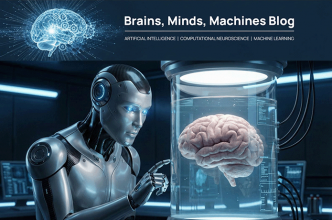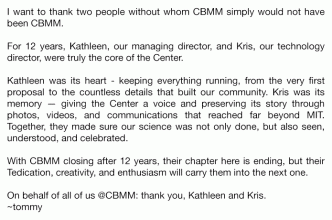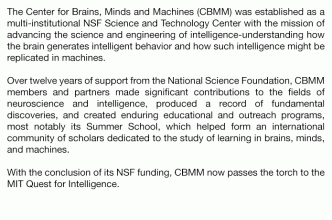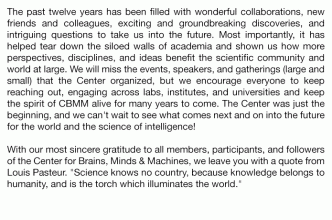Home Page Spotlights
After the conclusion of CBMM, we are continuing the research on the foundations of intelligence. To check our progress look at our blog posts at https://poggio-lab.mit.edu/blogsupdates
A note from CBMM's co-Director Tomaso Poggio.
Join us in celebrating the work and contributions of Kathleen Sullivan and Kris Brewer to the Center for Brains, Minds and Machines. We are wishing them farewell and best of luck on their next endeavors, while celebrating the end of CBMM.
A new study finds parts of the brain’s visual cortex are specialized to analyze either solid objects or flowing materials like water or sand.
Help us celebrate CBMM's Kathleen Sullivan on her successful completion of her Masters degree from Harvard!
How do neural networks work? It’s a question that can confuse novices and experts alike. A team from MIT’s Computer Science and Artificial Intelligence Lab (CSAIL) says that understanding these representations, as well as how they inform the ways...
It was with deep sadness when I learned the premature passing of Sayan Mukherjee...
Infants naturally learn about the world through a process of incremental understanding, building foundational concepts before tackling more complex ones.
More than 500 researchers, physicians, and students rallied at Boston Common on Friday to protest President Donald Trump’s efforts to cut federal funding for scientific research, lay off federal employees, and eliminate diversity, equity, and more.
Started in 1994 and always supported by the Liguria Region, is awarded to Tomaso Poggio, an internationally renowned scientist, born in Genoa, Ligurian pride in the world.
Congratulations to John J. Hopfield who spent a year in the Center for Biological Information Processing (CBIP) a grandparent of CBMM.
Sir Demis Hassabis spent more than a year at The Center for Biological & Computational Learning (CBCL), a direct parent of the Center for Brains, Minds, and Machines, researching with CBMM's Director Tomaso Poggio and others.
The Schmidt Sciences Polymath Program funds high-risk, innovative projects by providing multi-year grants to top researchers in critical areas from AI to climate change.















